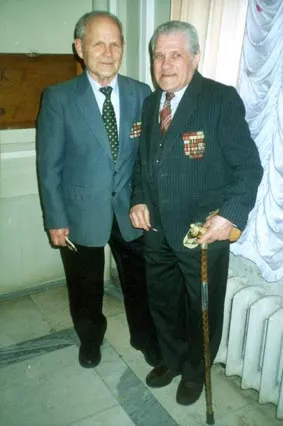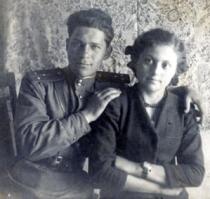The interviewee and his comrade Romanov
This photograph shows me together with my comrade Alexander Romanov. It happened in 2001 when we celebrated the 300th anniversary of our Naval School named after Frunze. My son Vitaliy took this photo in Maryinsky Theater, where we watched a ballet performance.
On June 14, 1941 I finished my school, on June 22 we were going to hold a meeting in celebration of it, but that day the war burst out. They cancelled our banquet, gave us urgently our certificates, and that was all. Approximately for a week I stayed in Kerch, and Komsomol leaders appointed me to be a company commander.
We participated in patroling the city streets (2 or 3 men together). And a week later I left for Leningrad. Here I entered the Naval School named after Frunze. I sent there my document beforehand, in 1940. That School celebrated its 300th anniversary in 2001 (it is older, than St. Petersburg itself, because it was created in 1701, and St. Petersburg - in 1703). According to the decree of the President Eltsin it was renamed Naval College of Peter the Great.
I entered the Naval School on July 3, as soon as I arrived from Kerch, and in August I was already at the front, here in Leningrad. I was a machine gunner (they changed our cloths for infantry uniform). At the end of September they brought us back to Leningrad and changed our uniform for naval one. We starved in blockade for three months, till December 9.
Later we moved to Astrakhan: our School had been already evacuated there. [Astrakhan is a city in the Delta of the Volga River.] It took us a month to get to Astrakhan by train. We got terribly dirty - black! But we were well fed, in compare with Leningrad.
We arrived in Astrakhan on 10th January 1942. Immediately from the railway station we were brought to bath-house, they gave us clean uniform and took to our School. And we started our studies. At first I studied at the command faculty. But soon we got to know that a lot of students from Hydrographic school perished on the ice of Ladoga Lake. Therefore in Astrakhan they offered us to change the faculty in case we wished. I agreed to change for hydrographic department, because I wanted to get engineering education.
By that time German troops approached Volga (Stalingrad, Volgograd at present). Our School students immediately finished their practical studies and moved to Baku. But we, specialists in topography ('educated' already after a year of studies) were made lieutenants: those who had not very good marks for exams became junior lieutenants, and those who had good and excellent marks (like me, for example) became lieutenants.
We were sent to Stalingrad hell. It was the time of the famous Stalingrad battle. By the way, not all students, specialists in hydrography were sent to the front line (only 28 from 100). And the rest 72 did not participate.
And Alexander Romanov was among them. He finished the School in 1945, went on serving and retired in the rank of commander. At present he lives in the suburb of St. Petersburg.
















